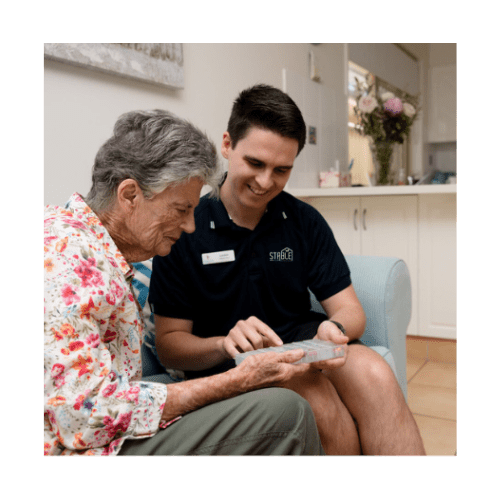In Home Caregivers and NDIS Plan Manager Roles: Navigating Home Care Providers in Australia
In Home Caregivers and NDIS Plan Manager Roles: Navigating Home Care Providers in Australia
Blog Article
How In Home Treatment Givers Address the Special Challenges and Emotional Needs of Family Members Seeking Assistance for Their Family Members
In-home caregivers play a critical function in navigating the complexities dealt with by families seeking assistance for their loved ones. By comprehending distinct household dynamics and offering customized psychological assistance, these experts not just address immediate care needs however additionally cultivate a setting of trust and open interaction (home care providers).
Recognizing Family Characteristics
Recognizing household dynamics is important for giving effective in-home care, as each family members runs within an unique collection of partnerships and interactions. These dynamics include different components, including communication styles, functions, and power frameworks that influence just how treatment is supplied and received. The caregiver needs to recognize these factors to make certain that care strategies straighten with the family members's expectations and values.
Various family members may exhibit distinctive patterns of interaction, such as collective approaches or hierarchical frameworks. In some family members, a main decision-maker might hold significant impact, while in others, decisions might be more autonomous. Recognizing these patterns aids caretakers tailor their strategies to fit the family members's certain requirements.
Additionally, social backgrounds play an important role fit household characteristics. Caregivers need to be culturally skilled, acknowledging and appreciating varied techniques and ideas that might affect care choices.
Eventually, a detailed understanding of family dynamics promotes boosted interaction, promotes depend on, and boosts the caregiver's capability to sustain the household properly. By acknowledging the intricate internet of connections and obligations, caretakers can develop an encouraging setting that advertises well-being for both the individual receiving treatment and the household in its entirety.
Providing Emotional Assistance
Giving emotional assistance is a necessary element of in-home treatment that significantly boosts the well-being of both the private receiving treatment and their household participants. In the context of caregiving, psychological assistance includes active listening, empathy, and validation of feelings. Caretakers are trained to identify the psychological battles that family members face, such as guilt, seclusion, and anxiousness, and to give a thoughtful existence that reduces these concerns.
By fostering open communication, caregivers create a safe area for member of the family to reveal their worries and concerns. This discussion not just encourages emotional launch yet likewise enhances depend on in between the caretaker and the family members. Additionally, caregivers can offer practical methods to aid families take care of stress and advertise strength.

Ultimately, the psychological assistance supplied by at home caretakers enhances the lifestyle for both clients and their family members, advertising an extra thoughtful and understanding caregiving atmosphere. This holistic method ensures that psychological requirements are dealt with alongside physical health and wellness considerations.
Managing Daily Treatment Tasks
Handling daily treatment tasks is an essential aspect of at home care that ensures people obtain the support they require to keep their wellness and self-reliance. Caretakers play a vital function in aiding with activities of everyday living (ADLs), that include bathing, clothing, brushing, and dish preparation. By tackling these duties, caregivers assist ease the psychological and physical burdens that households might encounter while caring for their loved ones.
In enhancement to individual treatment, caretakers are also tasked with drug monitoring, making certain that clients adhere to recommended timetables and does. This oversight is important for keeping wellness and preventing negative results from missed out on or wrong medications. Furthermore, caregivers often help with mobility, supplying assistance for customers moving their homes, consequently reducing the threat of drops and boosting total safety.

Promoting Open Interaction
Efficient management of daily treatment tasks typically rests on the top quality of communication in between caregivers, customers, and their households. Open up interaction fosters a setting where worries, choices, and comments can be freely traded, guaranteeing that treatment is tailored to satisfy individual requirements. Caretakers ought to focus on routine check-ins with both clients and their family members, assisting in discussions that resolve any type of concerns or modifications in treatment demands.
Making use of various interaction methods-- such as face-to-face conferences, phone calls, and composed updates-- can enhance understanding and supply families with tranquility of mind. It's necessary for caretakers to actively pay attention, showing empathy and respect for the psychological landscape of the family. Urging inquiries from family members can additionally help clear up treatment strategies and enhance the caregiver's commitment to openness.
Additionally, preserving open lines of interaction enables caretakers to identify and react promptly to any kind of find out changes in a client's wellness status or psychological well-being. This proactive method not just reinforces the caregiver-client dynamic but also empowers households to participate actively in the care procedure. Ultimately, fostering open communication is important for boosting the top quality of at home treatment and promoting a helpful environment for all involved.
Building Depend On and Relationships
Trust is the keystone of successful in-home treatment, as it establishes a structure for significant relationships between caregivers, clients, and their families. Building this count on requires consistent, clear interaction and an authentic dedication to the wellness of those included. Caregivers must show integrity with preparation, adherence to care strategies, and responsiveness to the demands and choices of clients.
To foster depend on, caregivers should engage in active listening, guaranteeing that households feel listened to and recognized. This includes not only addressing prompt issues but also anticipating future demands, consequently empowering family members and improving their feeling of control. Establishing rapport with shared experiences and respectful communications can even more strengthen these partnerships.
Additionally, caregivers should be trained to recognize and address the psychological intricacies dealt with by families. By showing empathy and empathy, they can minimize uncertainties and anxieties, strengthening trust fund. Normal updates and check-ins with relative can also improve openness, allowing them to really feel involved and informed regarding their enjoyed one's care.
Eventually, building trust fund over here and nurturing partnerships in in-home care is a collective procedure that considerably affects the high quality of treatment provided, fostering a helpful environment that profits every person involved.
Conclusion
By comprehending household dynamics, offering emotional support, and promoting open communication, caregivers boost the overall caregiving experience - home care providers australia. Their capacity to manage day-to-day care tasks while developing trust and solid partnerships cultivates a supportive environment for customers and their households.
Understanding family members characteristics is critical for providing efficient in-home treatment, as each family members operates within an one-of-a-kind collection of interactions and partnerships.Offering psychological assistance is a vital component of at home care that significantly enhances the health of both the private obtaining care and their household participants. By taking on these obligations, caregivers help ease the physical and emotional problems that families might face while caring for their enjoyed ones.
Efficient monitoring of everyday treatment tasks often hinges on the quality of interaction between caretakers, clients, and their have a peek at these guys households - in home caregivers.Count on is the cornerstone of effective in-home treatment, as it develops a foundation for significant relationships in between caretakers, customers, and their households
Report this page